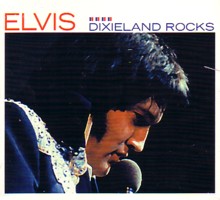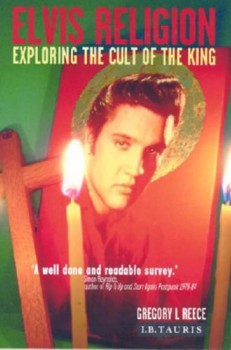 |
 |

Reece, Gregory L. Elvis religion: Exploring the Cult of the King, IB Tauris, London : New York, 2006. Pbk. 200 p. ISBN 10 1 84511 164 8; ISBN-13 978 1 84511 164 9.
Reece, a philosophy professor, investigated several aspects of the Elvis world, devoting a chapter to each. These are: Elvis fans, tribute artists and tribute artists-cum-priests, Elvis as depicted posthumously in movies, fiction, song, art, on the Internet and in the tabloids. His findings and their significance are discussed in a serious yet light-hearted manner in this publication, which is aimed at the general public rather than fans. Elvis fans, he discovered, were mostly sensible and realistic, and not radically different from other fun-loving people with hobbies; impersonators were basically entertainers specialising in one particular genre, and out to make a living and promote their careers, rather than taking on the role of high priests of Elvis. The discussion of the post-humous movies is interesting. Many of them are violent but redemptive, while some were non-violent and transformational. Reece was surprised to discover how far Elvis was a recurrent theme in fiction. There seemed to be some overuse of the words "bad taste", "tacky" and tackiness". It seems to be de rigour that writers add such terms to maintain acceptability among the American establishment. Not everyone agrees that Graceland is all bad taste. This is a subjective judgment.. As for tackiness, that implies "cheap and shoddy", but when referring to Elvis's furnishings or jumpsuits, they were certainly not that. "Tackiness" can apply to a lot of memorabilia, popular taste, some impersonators, their jumpsuits and performances, but not to everything. On the other hand, Reece was making the point that it was the from seamier side of Elvis's later decline and fall that the religious aspects come. It was Elvis's tragedy / later ridiculousness that makes him holy. Other books have also made a similar point. An aspect which was not mentioned is that churches are now beginning to look at Elvis as an outreach opportunity to bring the community back to religion. There are instances of churches using Elvis impersonators in church services or running Elvis gospel music courses in an attempt to reverse dwindling congregations. So, in the future, it may not be "Elvis and Religion" so much as "Religion and Elvis". There may be other shortcomings to the research. The study of fans' attitudes was based on observation of a group of fans collected at Graceland around Elvis's birthday in January of an undisclosed year and on personal conversations with an unspecified number of fans. An in-depth survey of a wider range of people would have been more thorough. Even so, the findings about current attitudes are probably valid. Also, coming to the topic as an outsider, Reece mentions "The thirty-one films that Elvis starred in (p. 47) without differentiating between 29 feature movies and two documentaries. Finally, while the general tone is humorous, I disliked the dismissal of fans as "trash", even as a joke. He talks of "white trash" (p. 67) and "southern white and euro-trash tourists" (p. 110). Am I, then, an "Australo-trash tourist"? In a country which values equality, surely it cannot be acceptable to regard any other human being as worthless and discardable. Verdict: All in all, this book is interesting and definitely thought-provoking reading. Susan MacDougall, September 2006 Buy "Elvis Religion: Exploring the Cult of the King" Read article: Is Elvis a religion?
|
|




